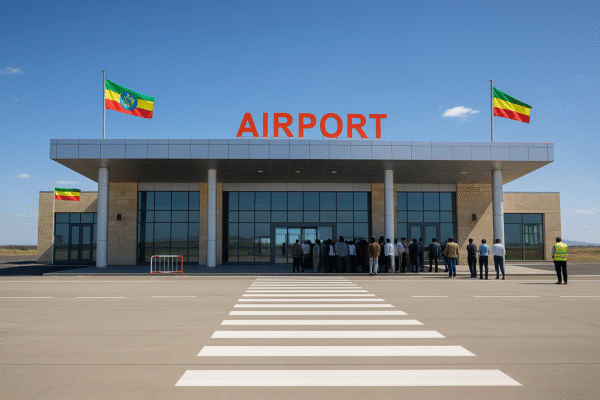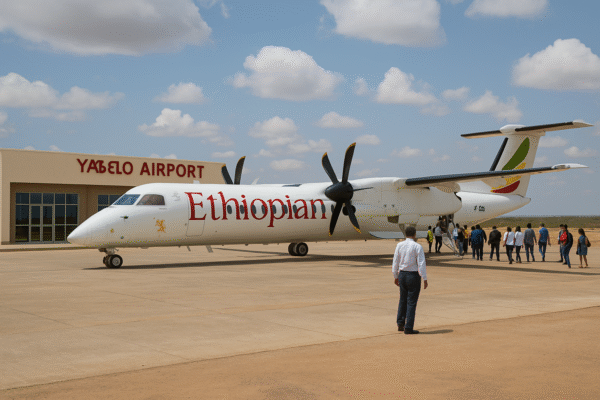Ethiopian Airlines has officially opened the brand-new Yabello Airport—an infrastructural milestone poised to redefine the future of Southern Oromia. This modern facility not only increases air service accessibility but also ignites a surge in tourism, trade, and socio-economic advancement across the Borena Zone. The significance of this development extends beyond aviation; it promises to herald a new era of prosperity for local communities.
A Bold Leap for Regional Aviation
On August 31, 2025, Ethiopian Airlines inaugurated the Yabello Airport, marking a major stride toward improving the region’s transportation network. Located just 11 kilometers from Yabello town, the airport includes a new airstrip, a temporary terminal building, upgraded roadway access, and essential support infrastructure. The project’s cost, exceeding one billion Ethiopian birr, reflects a strategic investment aimed at laying the foundation for long-term regional development.
This airport embodies Ethiopian Airlines’ broader objective to extend its domestic reach and enhance regional connectivity. As the flag carrier continues expanding its route network, Yabello is set to serve as a pivotal hub for southern Ethiopia, linking previously underserved areas directly to the rest of the country and beyond.
Catalyst for Tourism and Economic Revitalization
Tourism stands to be a primary beneficiary of the Yabello Airport. Southern Oromia’s Borena Zone is rich in cultural heritage, scenic landscapes, and traditional attractions, yet it has remained largely off the typical tourism map due to limited access. With the airport now operational, travelers—both domestic and foreign—can explore this unexplored frontier more easily, driving visitor numbers upward and creating demand for local hospitality services.
This influx of visitors translates to increased business in small hotels, tour operations, handicraft sales, and cultural experiences. With tourist arrivals on the rise, employment opportunities will expand in hospitality, transport, retail, and guiding sectors—laying the groundwork for grassroots economic growth.
Empowering Trade and Agriculture
Beyond tourism, the new airport will significantly boost trade. The Borena Zone is well-known for livestock and agricultural produce. Previously, transporting goods to national and international markets involved arduous road journeys with unreliable timelines. Air transport changes the equation entirely: perishables and high-value products can now reach markets swiftly and in prime condition. Farmers and traders will gain access to broader markets and better prices, invigorating local commerce and economic resilience.
Improved logistics from air connectivity also supports wider value chains—encouraging investment in processing facilities, cold chains, and packaging infrastructure. Over time, these enhancements can strengthen the regional economy, foster small-scale manufacturing, and spur agricultural modernization.
Advancing National Goals Through Regional Inclusion
The Yabello Airport aligns with Ethiopia’s national development strategies focused on decentralizing growth and ensuring equitable benefit distribution. By providing direct access to essential services—such as education, health, and administrative support—aviation becomes a conduit for social improvement. Remote communities gain easier access to urban centers, opening pathways for skill development, healthcare services, and economic opportunities.
As regional development becomes more balanced, stakeholders anticipate reduced urban migration pressures and improvements in overall human development indicators. This inclusive approach underscores a broader vision of building a robust, integrated national economy.
Ethiopian Airlines’ Strategic Vision
As Africa’s largest and most accomplished carrier, Ethiopian Airlines continues to lead regional aviation expansion. The Yabello Airport exemplifies the airline’s long-term Vision 2035 goal of establishing Ethiopia as a premier aviation and logistics hub. With its expanding fleet of Boeing 737s, 777s, 787s, Airbus A350s, and Dash 8 Q400s, the airline is well-equipped to serve a growing network of domestic, regional, and international routes.
Beyond infrastructure, Ethiopian Airlines’ investments in regional airports reflect a powerful commitment to inclusivity and equitable growth. By enabling underserved areas to access the global air transport system, the airline nurtures investment prospects and opens new channels for collaboration across borders.
Toward a Bright Regional Future
The inauguration of Yabello Airport marks the beginning of a transformative journey for Southern Oromia. Tourism markets will flourish, trade will become more vibrant, and local economies will steadily diversify. As visitors arrive to enjoy the region’s landscapes and cultural richness, communities will benefit from fresh income streams and social engagement.
Simultaneous enhancements in agricultural access and goods transport will modernize regional trade, catalyzing entrepreneurship and industrial activity. The resulting ripple effects—from better education access to healthcare improvements—further reinforce the airport’s role as a transformative instrument for social upliftment.
Conclusion: A Gateway to Growth
Yabello Airport stands to serve as a powerful gateway to new horizons. It is more than a transport hub—it is a beacon of opportunity, unity, and progress. By bridging Southern Oromia with Ethiopia’s heartland and the wider world, this landmark project elevates local aspirations, invigorates regional economies, and cements Ethiopia’s standing as an aviation powerhouse in Africa. As Ethiopian Airlines and regional stakeholders continue to collaborate, the airport’s full potential in tourism, commerce, and development will unfold—sparking enduring change for generations to come.
For more travel news like this, keep reading Global Travel Wire

















